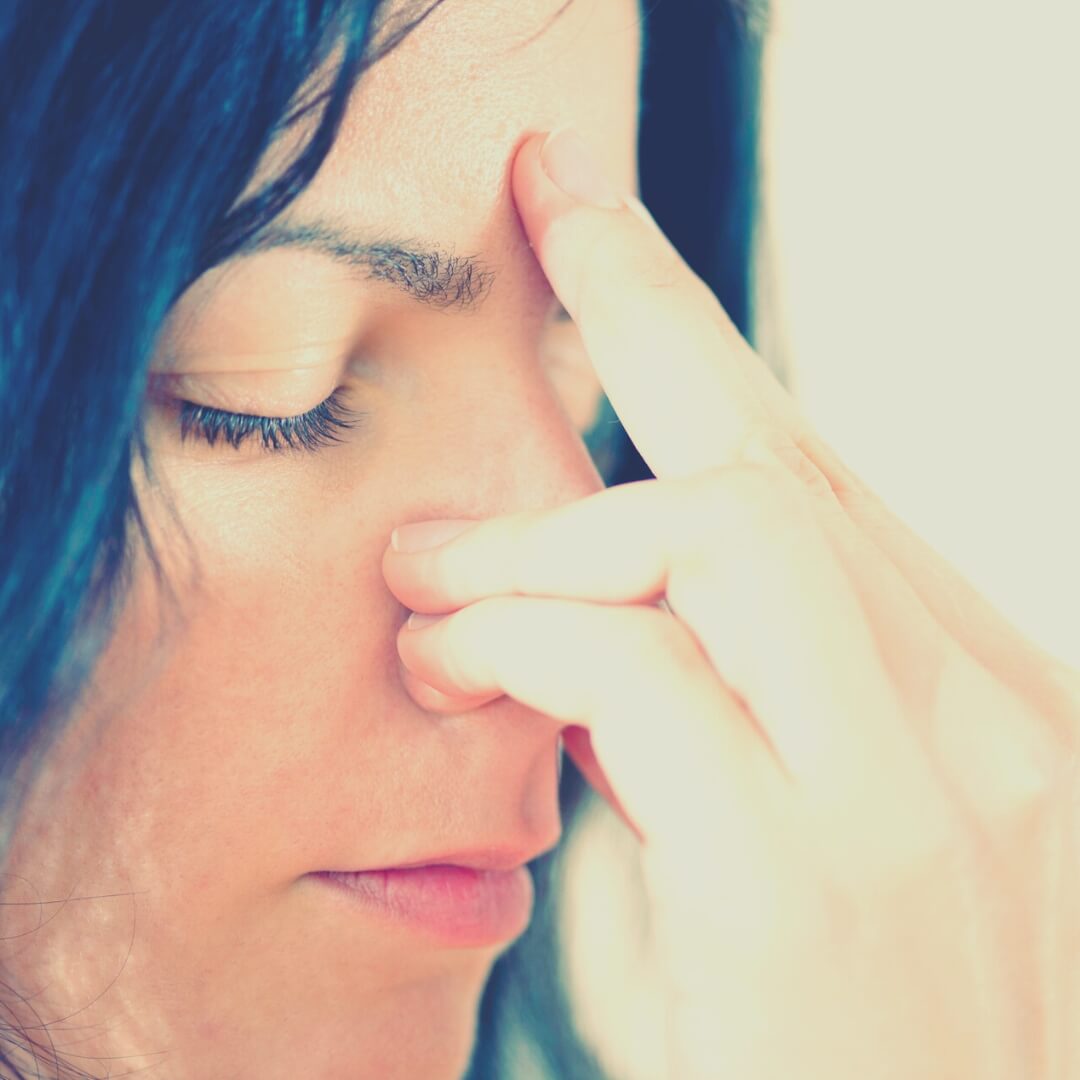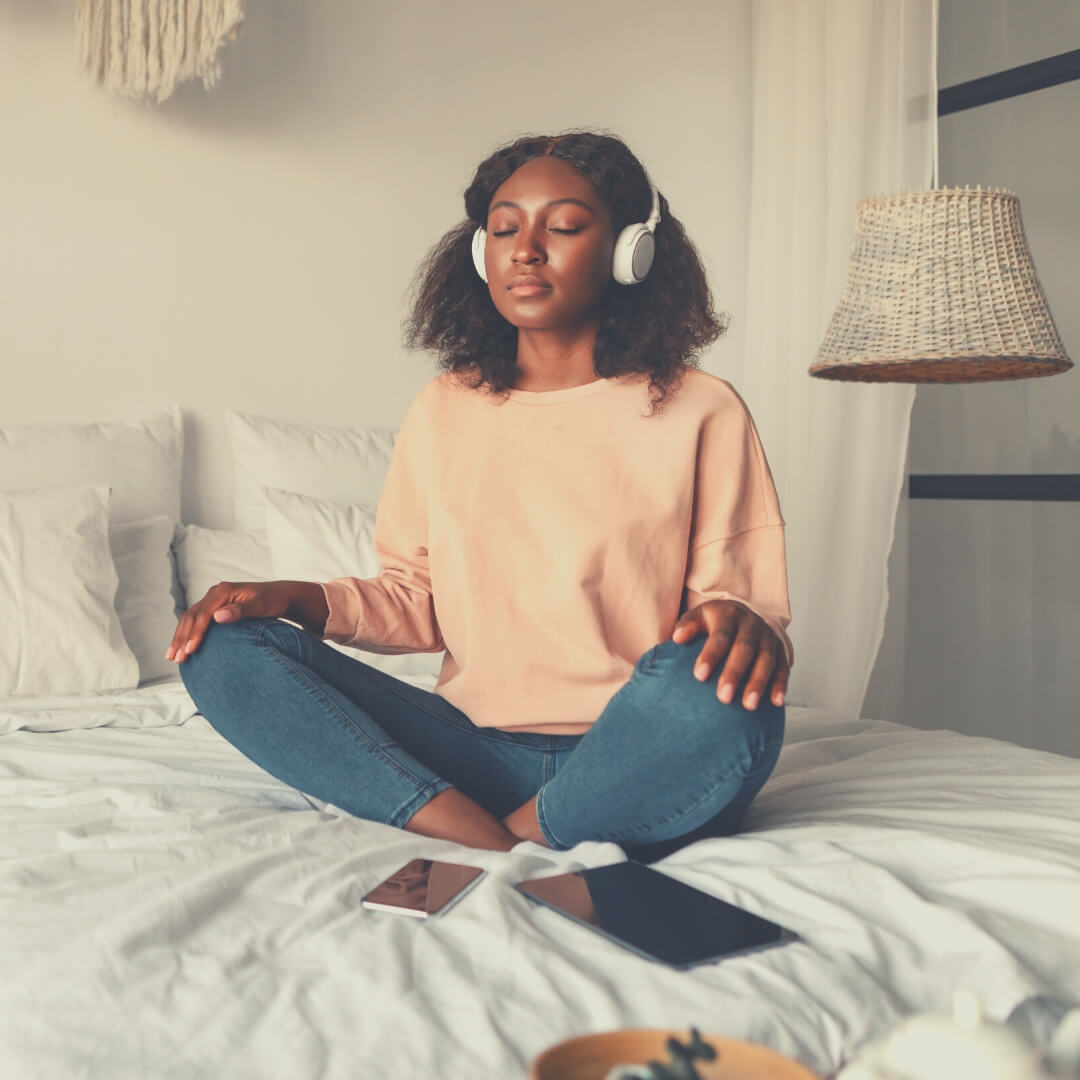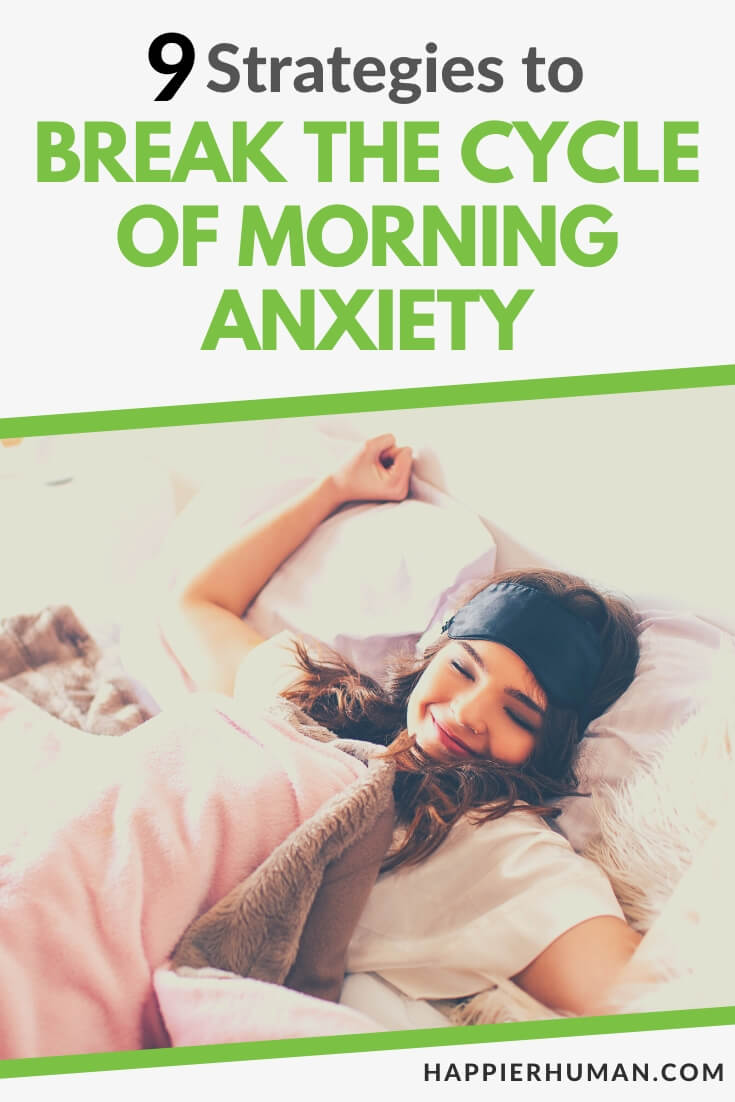Morning anxiety is a bummer when you’re hustling to kick-start your day. If you only knew how to break the cycle of morning anxiety, your day could begin on a positive note.
Thanks to morning anxiety, I’m bombarded with racing thoughts surrounding the uncertainties of my day from the very moment I open my darn eyes. It makes me not want to get out of bed!
Does this happen to you too? If so, know that you are definitely not alone when it comes to waking up anxious. The trick is not to let it last longer than it deserves. That or diffuse it before it grabs hold!
Anxiety is the most common mental condition affecting “nearly 30% of adults at some point in their lives.” For some, anxiety symptoms are present right when they wake… then fade away. This is unlike chronic anxiety which occurs any time of day.
Thankfully, conquering morning jitters could be as simple as starting your day with the right mindset. That alone can make a huge difference in how the rest of your day unfolds.
Let’s review common factors contributing to morning angst and how high levels of anxiety can affect your quality of life. Then, we’ll go over a list of morning anxiety relief techniques that will have you up and functioning at full capacity.
What Is Morning Anxiety?
Morning anxiety is anxiety that occasionally or regularly occurs in the morning, as opposed to throughout the day or at night. Someone experiencing this type of anxiety generally wakes up feeling worried, stressed, or afraid of facing their day.
Symptoms may last for a few minutes to hours. However, the time of day does not make morning anxiety any less serious. Although it’s not a formal mental health diagnosis, the symptoms can grow worse or become debilitating.
So, what’s all the worrying about? Well, 2019 statistics indicated that people worry the most about everyday things … such as finances, job responsibilities, caring for kids, health, and relationships.
There is also a group of people (roughly 51%) who worry about how politics will affect their daily lives. Even minor things, like upcoming appointments or needing to do repairs, can nag you and result in excessive worry or panic.
Why Is My Anxiety Worse in the Mornings?
Anxiety is triggered by physical, emotional, psychological, and environmental factors which can make it more noticeable in the morning.
Cortisol production
An increase in the stress hormone, cortisol, is a chief primary trigger of morning anxiety. Cortisol levels tend to rise when it’s time to wake up and remain elevated for at least 30-45 minutes later. Doctors call the phenomenon Cortisol Awakening Response (CAR).
Cortisol along with adrenaline are both triggered by the amygdala, the area of the brain that alerts us to danger. Adrenaline causes a “fight or flight’ sensation that causes you to feel anxious when there’s actual or perceived danger.
Falling asleep stressed
Going to bed stressed and anxious over money, family, or relationship matters may lead to higher levels of cortisol in the morning. Cortisol is released as a response to stress.
The hormone also plays a role in the production of glucose your body needs for energy when you wake up. Ironically, the same process can activate fight or flight symptoms.
Other common reasons why anxiety symptoms feel worse in the morning include:
There’s also a chance you have generalized anxiety disorder GAD and don’t know it. According to the Anxiety Disorders Association of Victoria, Inc., morning anxiety symptoms can be worse or more intense for people with GAD.
Is Morning Anxiety and Generalized Anxiety Disorder the Same?
No, but applying the tips provided on how to break the cycle of morning anxiety could prevent it from turning into an anxiety disorder.
Below is a breakdown of the various types of anxiety disorders along with the percentage of U.S. adults affected in any given year.
Morning Anxiety Symptoms
Morning anxiety shows up as ongoing worry and tension, which often trigger one or more of the following symptoms:
Some of the symptoms are similar to those associated with generalized anxiety disorder. However, GAD is more than simple morning jitters.
How Long Does Morning Anxiety Last?
As the name suggests, normal or non-chronic morning anxiety is typically fleeting. The sensation gradually subsides as you start going about your daily routines.
The toughest part is gaining your composure when you first wake up and get out of bed. Quickly dismissing your worries or soothing yourself using positive self-talk helps prevent the symptoms from prolonging and ruining your day.
Note that people who have generalized anxiety may also suffer from morning anxiety. A major distinction with GAD is that symptoms are more intense, occur more frequently or on a long-term basis, and are not restricted to mornings.
Your doctor will ask about the frequency, intensity, and length of time (days, weeks, months) you’ve been experiencing the symptoms to determine if it’s normal morning anxiety or GAD. Symptoms lasting more than 12 weeks typically end up being signs of generalized anxiety disorder.
Why You Should Manage Morning Anxiety
Getting a grip on the symptoms can prevent anxiety from escalating into chronic anxiety or GAD. Instead of occasionally in the AM, your symptoms may occur more days in the week, any time of day, and also increase in intensity.
Heightened anxiety can become mentally disabling and prevent you from carrying out daily activities. The domino effect doesn’t stop there. Trouble getting through your day or caring for loved ones can lead to feeling helpless, hopeless, or depressed.

Not having healthy coping skills may lead to unhealthy coping habits, such as smoking, drinking, or drug or medication misuse.
The great news is I’m about to provide you with a variety of self-help strategies to help take care of your mental health. They are tried and proven methods that can provide the relief you need to stay productive throughout the day.
9 Simple Ways to Keep Morning Anxiety in Check
Here at Happier Human, we want you to worry less and live more. In fact, the more you’re consumed by worrying thoughts… the longer the amygdala, or anxiety switch in the brain, stays activated. This leads to more worry and a higher risk of developing an anxiety disorder.
Today, we’ll review how changing habits and creating new morning routines can help minimize morning anxiety and help you start your day right. Feel free to do your own research on other ways to tame your amygdala in the morning.
#1. Change how you view morning anxiety
How you perceive an experience determines the effect it has on you.
If you wake up every morning worried that you’re worried, this only causes your brain to send more stress hormones and adrenaline to your body. Now that you’re aware of the domino effect, it’s time to view your morning anxiety differently.
First, acknowledge the symptoms. You could say, “I’m worried,” or “I’m afraid to face the day.”
Accept that a natural rise in cortisol levels in the mornings is out of your control.
Next, show yourself compassion by reminding yourself that it’s okay to feel this way. Self-compassion has a way of making you feel much better almost instantly.
#2. Cut out habits that trigger anxiety symptoms
Relief from anxiety can come from simply identifying and letting go of habits that put you at risk. After doing an inventory of behaviors that might make you anxious, you may recognize the need to make changes.
Do you need to quit smoking, reduce your coffee intake, or stop going to bed late? Or is it using electronics during the hours leading up to bedtime?
Caffeine and blue light from electronics can upset your circadian rhythm (natural sleep-wake cycle), making it difficult for you to fall or stay asleep. Anxiety, distress, irritability, and moodiness in the morning are known signs of sleep deprivation.
#3. Create a calm sleep environment
Getting adequate and quality sleep is a non-negotiable if you value the importance of a good night’s zzz.
Changing when and how you sleep is one way to wake up feeling rested, happy, and eager to start your day. The change may require creating an environment that is more conducive to sleep.
Ways to promote better sleep include using dark curtains to block out light and switching off the TV or radio to eliminate background noise. Sleeping on a quality mattress, comfortable pillows, and clean linen can help you wake up feeling calm.
#4. Change your wake-up routines
Unhealthy morning habits and routines might be what’s creating uneasiness.
Do you check your phone for text messages or work emails, or do you start your day catching up with the news? Staying in the know has its benefits but can also create worry and anxiety.
Maybe news that the stock market isn’t doing well causes you to worry about your investment. Morning text messages from your partner may create uncertainties about your relationship and leave you feeling on edge for the rest of the day.

A rule of thumb is to be mindful of what you filter into your system first thing in the morning.
Make a commitment to engage in morning activities that are mentally uplifting. For example, praying, listening to or reciting morning affirmations for anxiety, or reading daily words of inspiration. You’ll set a positive tone for your day by following those recommendations.
#5. Do deep breathing exercises
Practicing deep breathing first thing after you open your eyes in the morning is an effective way to prevent panic and dread. The exercise is simple and can be done before you slip out of bed. Calming your mind and body can be as simple as taking slow deep breaths.
A popular nerve-soothing technique is called the 4-7-8 breathing. Slowly breathe in for 4 seconds. Hold your breath for 7 seconds, then exhale slowly for 8 seconds. Repeat a few times until you feel less tense and ready to kickstart your day.
#6. Keep your mind on the present
The first moments of your day shouldn’t be spent ruminating about what went wrong yesterday. Those precious moments shouldn’t be overtaken by worries about bills, relationships, or what could go wrong today. Choose to live in the present moment.
Focusing on the present is a mindfulness meditation technique recommended by behavioral therapists. Centering attention on what’s happening right now helps block out worrying thoughts that trigger anxiety.
Start by focusing on where you are (environment), what you see, hear, and smell. Think about how the bedsheet feels against your skin. If something distracts you, bring your mind back to your mindfulness activity.
#7. Plan your day ahead of time
As someone whose anxiety gets triggered by uncertainty, I’ve found that planning ahead keeps me feeling calm and reassured. Perhaps you can try the plan-ahead strategy as well. Start by creating a list of chores, work assignments, or appointments for the next day.
Plan out what you’ll wear and allocate enough time for activities such as breakfast and getting the kids ready for school. If you’re worried about a recent setback, jot down ideas on how to resolve it.
Planning before going to bed provides a sense of direction and clarity for the following day. You should wake up feeling relaxed and prepared to tackle your day with greater confidence.
#8. Journal away your worries
A Thoughts Journal is a must-have for anyone who has anxiety, depression, or just simply wants a private place to vent. If you already have a journal, use it whenever you wake up feeling dread or apprehension.
You can say “I feel… (fill in the blank). Alternatively, question your emotions, e.g., write, “Why am I worried?” Immediately, you may become aware of things that are nagging at you on a subconscious level.

Write down what’s worrying you. This exercise helps you to put things in perspective. You may realize you’re concerned about things that can easily be resolved or are out of your control. Either way, you are now in control. Feeling in control helps to make us feel relieved.
#9. Cultivate a gratitude mindset
Reminding myself to be thankful each morning has saved me from an emotional meltdown so many times. “I am thankful to be alive,” is my favorite morning gratitude phrase.
As you practice mindfully living in the present, it becomes easier for you to spot when your mind drifts to unhealthy thoughts that cause you to become anxious. Conquer those thoughts by saying, “I’m lucky I woke up this morning,” or “I am grateful for life.”
The Bible also has a lot of gratitude scriptures for Christians. Philippians 4:6-7: “Do not be anxious about anything, but in everything by prayer and supplication with thanksgiving, let your requests be made known to God.”
Final Thoughts on How to Break the Cycle of Morning Anxiety
The habit of worrying in the morning may be something you do unconsciously but can still turn into a mentally debilitating practice. Using these strategies on a long-term basis will help you start your day fully functional and even prevent anxiety disorders.
You may also try adding these 73 Positive Affirmations for Anxiety Relief and Stress Reduction to your mental health care plan.
After all, taking care of yourself emotionally is not a one-and-done or one-size-fits-most process. It requires patience, self-care and self-awareness… which often requires a myriad of techniques.
Finally, if you want a simple way to reduce your stress and anxiety, then try writing these 35 mindfulness journaling prompts to live more in the present moment.
And if you're looking for more article about anxiety relief, be sure to check out these blog posts:
- 5 Best Teas to Calm Your Anxiety
- 13 Simple Coping Skills for Kids with Anxiety & Stress
- 20 Grounding Techniques to Reduce Anxiety & Cope With PTSD


